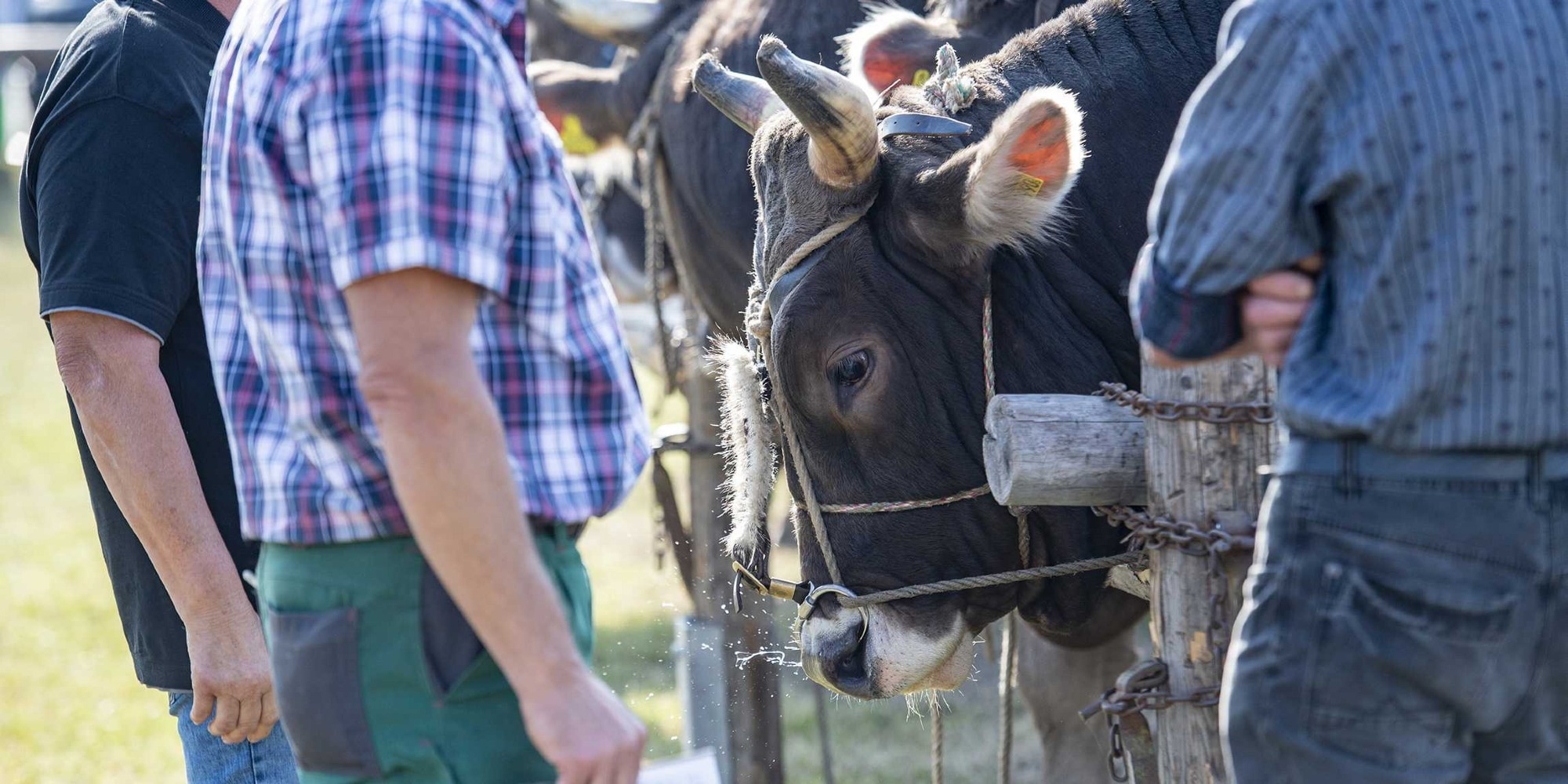One in eight couples worldwide are unable to conceive within a year, or lifelong due to infertility, making it a common issue. This is caused by male-specific reproductive abnormalities in half of the instances.
 Bulls for sale at the Zug bull market: fertility in males and bulls is controlled by the same genes. Image Credit: Urs Flueeler/Keystone-SDA
Bulls for sale at the Zug bull market: fertility in males and bulls is controlled by the same genes. Image Credit: Urs Flueeler/Keystone-SDA
It is challenging to determine the underlying genetic reasons for certain types of human fertility abnormalities, though. Data on molecular markers and semen quality from sufficiently large cohorts of healthy men of reproductive age are lacking for researchers.
Therefore, using appropriate lab animals bulls in this case, can gain a better knowledge of which genes and pathways regulate male fertility.
Under the direction of Hubert Pausch, ETH Zurich Professor of Animal Genomics, a study team examined young bulls to thoroughly examine which genes are active in various reproductive organ tissues and how this impacts the animals' fertility. The journal Nature Communications published their study.
The testicles, epididymis, and vas deferens of 118 recently killed bulls of reproductive age were used as samples for this study by researchers from the Institute of Agricultural Sciences. The research did not result in the animals' deaths.
Using these biopsies, the scientists were able to characterize the bulls' transcriptomes, or all the messenger RNAs (i.e., the gene transcripts) present in each type of tissue. The researchers were able to determine which genes are active in each of the three tissues as a result.
They created matching transcriptome profiles for the bulls based on that information. After that, they contrasted these characteristics with mouse and human profiles.
Many Genes Involved
Through this research, the team discovered a large number of genes and their variants that are associated with fertility in bulls. Most of the genes found are also likely to be relevant to male fertility in humans. In evolutionary terms, the regulation of male fertility is ‘highly conserved’.”
Xena Marie Mapel, Study First Author, Department of Animal Genomics, ETH Zurich
This indicates that the genes involved in reproduction work similarly in all mammals.
These genes are closely linked to poor fertility in bulls. Such subfertile bulls do not show up during conventional ejaculate screening. However, they can be reliably detected with our new marker genes.”
Xena Marie Mapel, Study First Author, Department of Animal Genomics, ETH Zurich
Unusual Animal Model
Cattle make an uncommon animal model, yet they are perfect for these kinds of experiments. Breeding organizations often collect ejaculate from the animals twice a week as part of their regular operations, and one reason for this is that the genes of breeding bulls are well understood.
This is thoroughly examined before being diluted and given to hundreds of cows for insemination; if the ejaculate is of low quality, it is thrown away.
The fact that every animal in the bull cohort under analysis is of comparable age is another fantastic benefit. “This cohort is very homogeneous. If we had to carry out a comparable study on men, we would have to rely on voluntary donors, potentially across all possible age groups. This would give us data that is very difficult to compare.”
Every year, Swiss recruits to the armed forces provide data on their fertility, but this data is rarely useful for such analysis. “We do not know what influences the men were exposed to before they took the fertility test, which will be different for every test subject. Furthermore, it is practically impossible to obtain tissue samples from their reproductive tract, as that would entail an invasive medical procedure.”
Findings to Benefit Livestock Breeders
Better diagnostics to identify the related genes and their mutations in breeding bulls are already being made possible by these new results, however, it is unclear how they will be used in human fertility studies just yet.
Therefore, since the results would lessen the financial losses associated with unsuccessful artificial inseminations, cattle breeders will probably be the first to gain from the research.
Even though all bulls have their ejaculate quality checked before usage and their calves' genomes examined, some infertile bulls manage to get through. Cows will not conceive if a breeder inseminates them with the semen of an infertile bull.
A typical Swiss dairy farm spends several thousand Swiss francs a year artificially inseminating its herd of cows and at 80 Swiss francs for each insemination, that can quickly deplete a breeder's funds. But the story does not end there.
The farmers frequently have to replace the unsuccessfully inseminated cows since they do not produce milk and do not give birth to calves. And it is financially costly.
Currently, artificial insemination is the norm for breeding pigs as well as dairy and beef cattle. Approximately 800,000 cows in Switzerland undergo artificial insemination each year. Seldom do bulls and cows mate naturally; this is known as a natural mating.
Hubert Pausch said, “Raising a bull is not easy. Most farmers do not have the space for such a large animal.”
Source:
Journal reference:
Mapel, X. M., et.al. (2024). Molecular quantitative trait loci in reproductive tissues impact male fertility in cattle. Nature Communications. doi.org/10.1038/s41467-024-44935-7